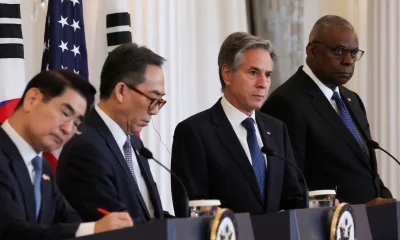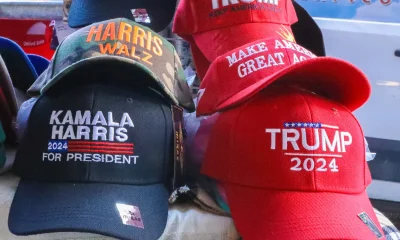Top stories
Taiwan Crisis: US-China Nuclear Talks Reveal Tense Showdown and Hidden Threats

In a dramatic turn of events, the United States and China resumed informal nuclear arms talks in March after a five-year hiatus. This unprecedented dialogue in a Shanghai hotel room is the first of its kind since 2019, and its focus is nothing short of explosive: Taiwan.
The U.S. delegates, wary of China’s growing military might, voiced concerns about the potential use of nuclear weapons if China faced defeat in a conflict over Taiwan. Beijing, which sees Taiwan as a breakaway province, offered reassurances. Chinese representatives claimed they could secure a victory over Taiwan using conventional forces alone, without resorting to nuclear threats. But can these assurances be trusted, or are they merely a façade?
These Track Two talks, involving former officials and scholars, are distinct from official government-to-government negotiations, known as Track One. While informal, these discussions often reflect the underlying positions and strategies of both nations. Despite their informal nature, the stakes could not be higher, as both powers are locked in a geopolitical rivalry with Taiwan as a potential flashpoint.
The Pentagon estimates a significant increase in China’s nuclear arsenal, from 2021 to 2023, heightening U.S. fears. China’s aggressive military activity around Taiwan over the past four years has only exacerbated these concerns. The U.S. and China briefly resumed official nuclear talks in November, but these have since stalled. Frustrations are palpable, with U.S. officials publicly expressing dissatisfaction with China’s lack of responsiveness.
David Santoro, the U.S. organizer of the Track Two talks, highlighted China’s claim of adhering to its longstanding “no-first-use” nuclear policy. Yet, the U.S. side remains skeptical. With China’s rapid modernization of its nuclear forces, including next-generation ballistic missile submarines and hypersonic glide vehicles, doubts linger. Is China’s policy of minimal deterrence still valid, or has it evolved into a more aggressive stance?
China’s expanded arsenal, encompassing anti-ship cruise missiles, bombers, intercontinental ballistic missiles, and submarines, raises eyebrows. Critics argue that this arsenal exceeds the needs of a state committed to minimal deterrence and a no-first-use policy. Instead, it suggests a strategic shift aimed at ensuring survivability and deterring U.S. nuclear superiority.
China’s reliance on “risk and opacity” to balance U.S. nuclear superiority is a troubling strategy. It creates a dangerous ambiguity, leaving room for miscalculations and escalating tensions. The U.S. delegation underscored the importance of continued dialogue, even without clear expectations, to mitigate these risks.
While the March discussions highlighted frustrations, both sides agreed on the necessity of continued dialogue. Plans for further talks in 2025 indicate a willingness to keep communication channels open, despite the glacial pace of progress.
As the U.S. and China navigate this complex landscape, the future of Taiwan hangs in the balance. The informal talks in Shanghai may have provided some reassurances, but the underlying tensions and rapid nuclear developments suggest a more volatile scenario. The world watches closely, hoping that diplomacy prevails over the shadows of hidden threats.
Top stories
Ethiopia Launches National Coffee Platform to Boost Export Earnings

Ethiopia, the birthplace of coffee, has launched a National Coffee Stakeholder Engagement Platform aimed at enhancing the country’s coffee production, quality, and export revenues. The initiative, inaugurated Thursday in the capital Addis Ababa, seeks to address persistent challenges in the coffee sector while leveraging opportunities to maximize its economic potential.
Adugna Debela, director-general of the Ethiopian Coffee and Tea Authority, underscored the platform’s role in fostering inclusive dialogue among stakeholders across the coffee value chain.
“The platform provides access for all stakeholders to discuss various coffee-related issues, from cultivation to marketing, with the aim of enhancing the country’s coffee productivity and quality,” Debela said during the launch.
Key priorities include:
- Establishing quality standards to improve branding and marketing.
- Promoting specialty coffee trading, a growing segment in global markets.
- Streamlining discussions on challenges like climate change, pricing volatility, and supply chain inefficiencies.
Ethiopia has long been synonymous with coffee, contributing to its culture and economy. In the last Ethiopian fiscal year, which ended on July 7, 2024, the country earned $1.43 billion from coffee exports. Now, it is setting an ambitious target of increasing this revenue to $2 billion by 2024/2025.
Ethiopian State Minister of Finance for Economic Cooperation Semereta Sewasew described the platform as a “significant step forward” in addressing systemic hurdles and capitalizing on global demand for Ethiopian coffee, particularly in premium markets.
The emphasis on specialty coffee reflects Ethiopia’s intention to carve a niche in high-value markets. Ethiopian coffee, known for its unique flavors and origins such as Sidama, Yirgacheffe, and Harrar, has long been prized by connoisseurs.
To achieve its goals, Ethiopia aims to:
- Strengthen Branding: Establish a cohesive identity for Ethiopian coffee to differentiate it in competitive global markets.
- Ensure Sustainability: Support coffee farmers in adopting sustainable practices that address environmental and social concerns.
- Improve Productivity: Provide resources and training to enhance yields while maintaining quality.
While the platform offers a roadmap to revitalizing the sector, Ethiopia faces several hurdles:
- Climate Vulnerability: Shifts in weather patterns threaten coffee yields and quality.
- Market Access: Smallholder farmers, who produce the majority of Ethiopian coffee, often face barriers to entering lucrative international markets.
- Price Fluctuations: Global coffee prices can be volatile, impacting the stability of export revenues.
By bringing together farmers, exporters, policymakers, and other stakeholders, the platform aims to create a unified approach to addressing these challenges.
Ethiopia’s efforts come at a time when global coffee demand is rising, particularly for specialty and sustainably sourced products. With this initiative, Ethiopia not only seeks to boost its export earnings but also to solidify its reputation as a leader in the coffee industry.
The platform represents a critical step in aligning the country’s coffee sector with global trends, ensuring that its farmers and exporters are well-positioned to thrive in an evolving market.
Top stories
Trump Selects Brooke Rollins as Agriculture Secretary
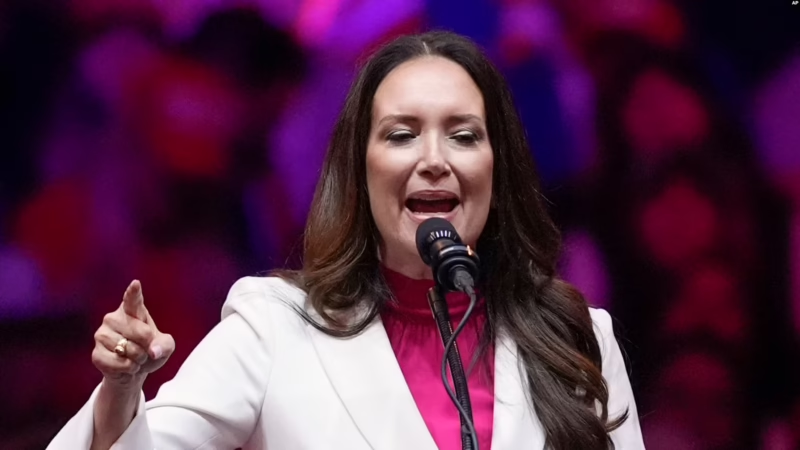
U.S. President-elect Donald Trump announced his nomination of Brooke Rollins, the president and CEO of the America First Policy Institute (AFPI), as his choice for agriculture secretary. Rollins, who played a key role in shaping domestic policy during Trump’s first term, is poised to lead a sprawling federal agency with profound influence over American agriculture, food systems, and rural economies.
In a statement Friday, Trump praised Rollins for her dedication to protecting American farmers, whom he described as “the backbone of our Country.”
If confirmed, Rollins would oversee the U.S. Department of Agriculture (USDA), a vast agency with a 2024 budget of $437.2 billion and a workforce of approximately 100,000 employees. Its responsibilities include:
- Administering farm and nutrition programs.
- Overseeing food safety inspections.
- Guiding rural development initiatives, including broadband expansion.
- Conducting agricultural research and development.
- Shaping international trade policies for the agricultural sector.
The department’s decisions often ripple through American households, affecting food costs, dietary guidelines, and the economic stability of rural communities.
Rollins would step into the role at a critical juncture for U.S. agriculture, with several pressing issues on the horizon:
- Biofuels and Clean Energy
Rollins would be responsible for advising the administration on the implementation of clean fuel tax credits for biofuels, a sector pushing to expand into sustainable aviation fuel (SAF) production. - Trade Negotiations
With the U.S.-Mexico-Canada Agreement (USMCA) up for renegotiation next year, Rollins would play a pivotal role in resolving disputes, including Mexico’s proposed ban on genetically modified corn and Canada’s dairy import quotas. - Tariff Policy
Trump has indicated plans to reintroduce sweeping tariffs, potentially affecting key agricultural exports and raising concerns about retaliatory measures from trading partners. - Rural Revitalization
In line with Trump’s vision, Rollins is expected to focus on revitalizing rural communities, advocating for infrastructure investments, and bolstering small-town economies reliant on agriculture.
Rollins’ Background and Vision
As CEO of the AFPI, Rollins has been a leading proponent of Trump’s “America First” policy agenda, with a focus on deregulation, domestic energy production, and economic growth. During Trump’s first term, she chaired the Domestic Policy Council, where she was instrumental in crafting initiatives aimed at rural development and workforce expansion.
Her nomination signals a continuation of Trump’s populist messaging, emphasizing support for American farmers and food self-sufficiency. “Brooke’s commitment to American agriculture and her vision for restoring small-town prosperity are second to none,” Trump said.
Rollins emerged as Trump’s pick after speculation that he might select former U.S. Senator Kelly Loeffler, a loyal ally and co-chair of his inaugural committee. Rollins’ nomination underscores Trump’s preference for appointees with policy expertise and a track record of advancing his administration’s goals.
Navigating Confirmation
Rollins faces a Senate confirmation process that could prove contentious, as agriculture policy touches on bipartisan priorities ranging from climate change and food security to rural development and international trade.
If confirmed, Rollins will need to balance Trump’s populist rhetoric with pragmatic solutions to address the complex challenges facing American agriculture in a volatile global market. Her leadership will shape the future of a sector vital to both the U.S. economy and its geopolitical strategy.
This nomination highlights Trump’s broader effort to assemble a Cabinet focused on implementing his ambitious “America First” agenda, even as it grapples with the realities of a deeply divided political landscape.
Top stories
Trump Picks Hedge Fund Manager for Treasury Secretary
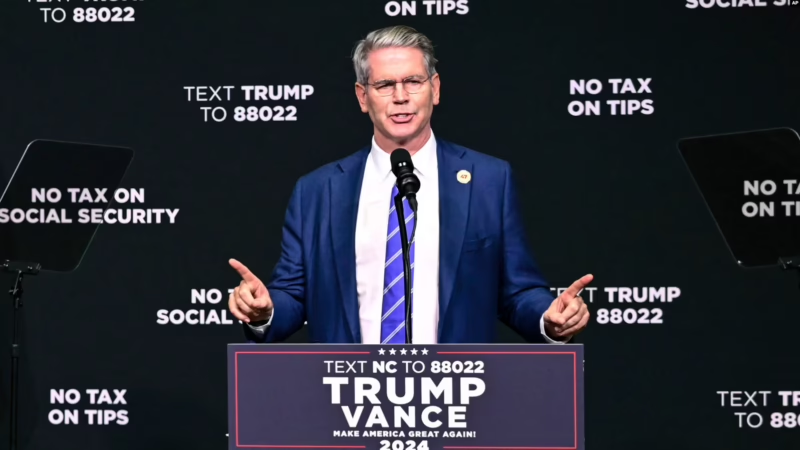
President-elect Donald Trump unveiled a series of high-profile Cabinet appointments on Friday night, headlined by the selection of hedge fund manager Scott Bessent as his nominee for Secretary of the Treasury. If confirmed, Bessent would become the first openly gay person to hold the position.
Bessent, 62, is a billionaire investor and founder of Key Square Capital Management, a hedge fund with deep roots in global markets. A longtime associate of Soros Fund Management, Bessent has emerged as a vocal advocate of Trump’s economic policies. Despite previously supporting Democratic candidates, Bessent now aligns with Trump’s vision of economic revival through tax cuts and tough trade measures targeting China.
“This election is the last chance for the U.S. to grow its way out of this mountain of debt without becoming a European-style socialist democracy,” Bessent said in August, signaling his focus on deficit reduction.
Trump praised Bessent as a “world-renowned international investor and geopolitical strategist” in a statement on Friday, adding that he was confident in Bessent’s ability to steer the nation’s economic policies.
Key Economic and Domestic Picks
Trump also announced other major appointments:
- Russell Thurlow Vought as Director of the Office of Management and Budget. A veteran of the Trump administration, Vought is known for his conservative fiscal policies and role in shaping the right-leaning “Project 2025” blueprint, although Trump distanced himself from the plan during his campaign.
- Lori Chavez-DeRemer, a former Oregon congresswoman, was nominated as Secretary of Labor. Trump touted her ability to unite business and labor interests, a key component of his “America First” agenda.
- Scott Turner, a former NFL player and director of the White House Opportunity and Revitalization Council under Trump, was picked to head the Department of Housing and Urban Development (HUD).
Health and National Security Picks
Trump’s health-related nominations include:
- Janette Nesheiwat, a family medicine doctor and Fox News contributor, as Surgeon General.
- Dave Weldon, a former congressman and medical doctor, to lead the Centers for Disease Control and Prevention (CDC).
- Martin Makary, a surgeon and Johns Hopkins professor, as Commissioner of the Food and Drug Administration (FDA).
On the national security front:
- Alex Wong, a former State Department official who played a role in negotiations with North Korea, was tapped for Deputy National Security Adviser.
- Sebastian Gorka, a conservative commentator with decades of experience in counterterrorism, was named Senior Director for Counterterrorism at the White House.
Controversies and Challenges Ahead
Several of Trump’s appointees are expected to face intense scrutiny during Senate confirmation hearings.
- Pete Hegseth, nominated for Defense Secretary, has been accused of misconduct during his military service.
- Robert F. Kennedy Jr., a vaccine skeptic and Trump’s pick for Health and Human Services Secretary, has sparked bipartisan concerns.
- Tulsi Gabbard, a former Democratic congresswoman turned Trump ally, has been nominated as Director of National Intelligence despite accusations of spreading misinformation and promoting pro-Russian narratives.
A Historic Senate Test
While Republicans will hold a slim 53-47 majority in the Senate next year, intense Democratic opposition means Trump can afford to lose only four GOP votes to secure confirmation for his nominees. Despite this, modern U.S. political precedent suggests that presidents are typically granted deference in filling their Cabinet, with no nominee being rejected since 1989.
The appointments highlight Trump’s focus on loyalty and ideological alignment as he builds his administration. Each nominee reflects a mix of traditional Republican priorities and Trump’s disruptive approach to governance, setting the stage for a potentially contentious confirmation process.
Top stories
China Expands Visa-Free Travel to Nine More Nations to Bolster Economy
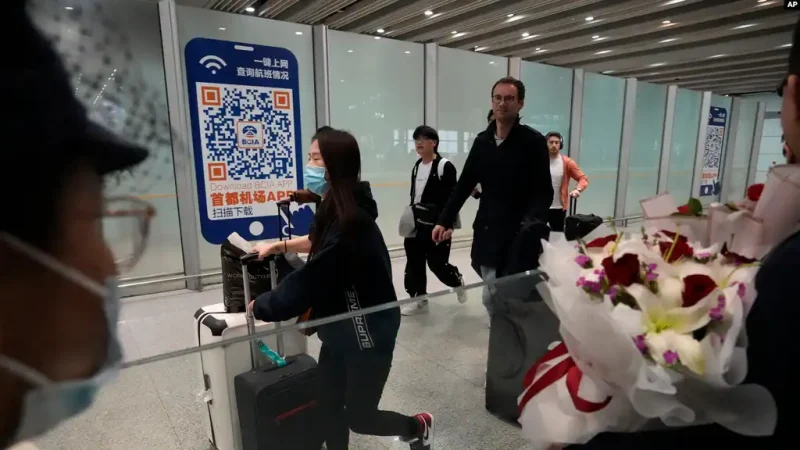
China announced on Friday that it would extend visa-free entry to citizens of nine additional countries. The move, effective November 30, aims to attract more tourists and business travelers amid a broader push to stimulate economic activity.
Foreign Ministry spokesperson Lin Jian confirmed that travelers from Bulgaria, Romania, Malta, Croatia, Montenegro, North Macedonia, Estonia, Latvia, and Japan will be eligible for 30-day visa-free stays in China. This expansion brings the total number of visa-free countries to 38, marking a significant shift from the three countries that held this status before the COVID-19 pandemic.
Strengthening Regional and Bilateral Ties
The inclusion of Japan, a notable addition, reflects China’s recent efforts to repair relations with its neighbor after a series of diplomatic disagreements. Tensions between the two nations have been exacerbated by Tokyo’s increasingly vocal stance on the Taiwan issue and disputes over the release of treated radioactive water from the Fukushima nuclear plant. However, a deal reached in September on the Fukushima matter may have paved the way for improved ties.
Japan had visa-free access to China prior to the pandemic, and its reinstatement fulfills a long-standing request from Tokyo. Japanese Chief Cabinet Secretary Yoshimasa Hayashi welcomed the announcement, expressing hope that the measure would facilitate smoother exchanges between the two nations.
Expanding People-to-People Exchanges
Beyond tourism, China has emphasized the importance of fostering people-to-people exchanges to strengthen its relationships with other nations. Lin highlighted that participants in academic, cultural, and other exchange programs would now be eligible for visa-free entry, reflecting Beijing’s commitment to promoting educational and professional interaction.
The permitted length of stay for visa-free travelers has also been extended from 15 to 30 days, a change expected to make travel more appealing for longer-term visits.
A Gradual Reopening Post-Pandemic
China’s border restrictions during the COVID-19 pandemic were among the strictest globally, and the country reopened to international travel significantly later than most. Since lifting its restrictions, Beijing has progressively expanded visa-free access.
- In July 2023, citizens of Brunei and Singapore saw the restoration of their visa-free privileges.
- By December 1, 2023, six European nations—France, Germany, Italy, the Netherlands, Spain, and Malaysia—were added to the list.
This phased approach underscores China’s cautious yet deliberate efforts to reignite its tourism and travel sectors, which were heavily impacted during the pandemic.
Economic and Tourism Impacts
The visa-free initiative aligns with broader efforts to boost inbound tourism and business travel, key drivers of China’s service sector. Official figures show that between July and September 2023, the country recorded 8.2 million foreign entries, with 4.9 million arriving visa-free, according to the state-run Xinhua News Agency.
Notably, countries like Thailand have also introduced visa-free entry for Chinese citizens, seeking to attract China’s vast pool of outbound tourists. This reciprocal easing of travel restrictions highlights the interconnected nature of regional economies and their reliance on tourism.
A Strategic Move
China’s decision to expand visa-free access is not just an economic measure but also a diplomatic one. By facilitating smoother travel for citizens of key nations, Beijing signals its intention to rebuild international relationships strained by geopolitical tensions and pandemic-era isolation.
For its part, Japan appears cautiously optimistic about the development, and other nations are likely to monitor the program’s success closely. If effective, the visa-free initiative could serve as a model for further opening China’s borders and reintegrating its economy into the global landscape.
Top stories
Kenya Scraps $2.5 Billion Adani Deals Following U.S. Indictment of Indian Tycoon
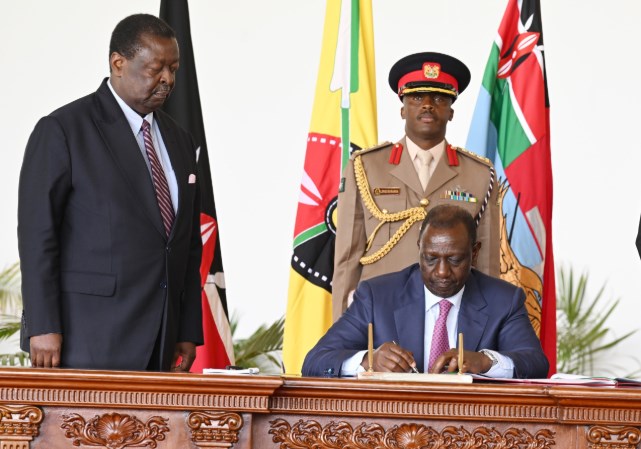
Kenya’s President William Ruto has cancelled more than $2.5 billion in contracts with India’s Adani Group after the company’s founder, Gautam Adani, was indicted in the United States on charges of bribery. The decision, announced during Ruto’s state of the nation address on Thursday, represents a significant blow to the conglomerate’s international expansion and comes amid growing scrutiny of its global operations.
Cancelled Contracts
Two major deals with Adani Group were terminated:
- Airport Development: A nearly $2 billion agreement to construct a second runway and upgrade the passenger terminal at Nairobi’s Jomo Kenyatta International Airport (JKIA) in exchange for a 30-year lease.
- Energy Infrastructure: A $736 million public-private partnership signed last month for the construction of power transmission lines.
Ruto directed agencies within the Ministries of Transport and Energy to immediately halt the procurement processes. He attributed the cancellations to “new information provided by investigative agencies and partner nations,” a veiled reference to the U.S. indictment.
The announcement drew applause from lawmakers in parliament and resonated with a public increasingly critical of the deals, which many viewed as opaque and lacking in accountability.
Adani Group Allegations and Denials
The U.S. indictment accuses Gautam Adani and seven co-defendants of paying approximately $265 million in bribes to Indian government officials to secure lucrative contracts. These allegations add to existing controversies surrounding the Adani Group, including a 2023 report by short-seller Hindenburg Research, which accused the company of improper governance practices and financial irregularities—claims the Adani Group has consistently denied.
In a statement responding to the U.S. charges, the Adani Group dismissed the allegations as baseless and pledged to pursue “all possible legal recourse.”
Criticism and Protests in Kenya
The Adani Group’s deals in Kenya have faced mounting opposition, particularly the airport project, which was proposed in March under a procedure bypassing competitive bidding. It only became public knowledge through a social media leak in July, sparking public outcry.
In September, a Kenyan court temporarily blocked the airport deal following a lawsuit that argued it failed to provide value for money to taxpayers. Despite the controversies, senior government officials, including Ruto, defended the agreements until recently. Energy Minister Opiyo Wandayi, for instance, told senators hours before the president’s announcement that the power transmission deal would proceed as no corruption had been detected in its awarding.
Legal Implications
Legal experts suggest that the Adani Group may challenge the cancellations through arbitration, particularly concerning the power transmission contract, which had already been signed.
“Any dispute resolution framework is likely to lean toward the state, considering the fact that the deal has been cancelled on the basis of integrity issues,” said George Kamau, a Kenyan lawyer specializing in public procurement.
A Shift in Kenya’s Approach
Ruto’s decision reflects a broader move to distance his administration from controversial deals and bolster Kenya’s reputation for governance. It also highlights the impact of international collaboration on combating corruption. By citing “information from partner nations,” Kenya signals its readiness to align with global standards on accountability, a step likely to resonate with the international community.
The cancellations come at a time when Kenya is grappling with rising public debt and pressure to improve infrastructure. While the termination of these high-profile deals may reassure critics of Adani’s practices, they also raise questions about the country’s strategy to attract foreign investment and develop critical infrastructure.
For the Adani Group, the fallout represents a growing challenge to its global ambitions as scrutiny intensifies over its business practices.
Top stories
Trump Picks Pam Bondi for Next Attorney General

President-elect Donald Trump’s nomination of former Florida Attorney General Pam Bondi as the next leader of the Department of Justice (DOJ) marks a calculated move to navigate the complexities of Senate confirmation while solidifying his administration’s commitment to his “America First” agenda.
Bondi, a long-time Trump ally, replaces Rep. Matt Gaetz (R-Fla.) as the nominee, following Gaetz’s withdrawal amid mounting controversy over his candidacy. Her selection underscores Trump’s preference for loyalists who have demonstrated unwavering support during pivotal moments of his political career, including her role as a senior adviser during his first impeachment defense.
Matt Gaetz Withdraws as Trump’s Pick for Attorney General Amid Ethics Concerns
Bondi served as Florida’s attorney general from 2011 to 2019, gaining prominence for her legal challenges against Obama-era policies such as the Affordable Care Act. Her tenure also included high-profile defenses of conservative social policies, including the state’s ban on same-sex marriage.
Her relationship with Trump extends beyond their shared ideological alignment. She was a visible figure in his impeachment defense and a vocal supporter during his legal battles, including attending his New York hush money trial. Bondi currently chairs the Center for Litigation at the America First Policy Institute and maintains ties to Ballard Partners, a lobbying firm central to Trump’s orbit.
Bondi’s nomination comes just days after Gaetz, initially tapped for the role, stepped aside, citing concerns that his appointment had become a distraction. Gaetz’s nomination had faced significant opposition due to his controversial past, including an investigation into alleged sex trafficking. Though the DOJ declined to pursue charges, his polarizing reputation and difficulty securing Senate support ultimately forced his withdrawal.
Unlike Gaetz, Bondi is seen as a more confirmable candidate, earning immediate praise from key Republican senators. Sen. Lindsey Graham (R-S.C.), set to chair the Senate Judiciary Committee, described her nomination as a “grand slam” and predicted a smooth confirmation process.
While Bondi’s partisan alignment aligns closely with Trump’s vision for a reshaped DOJ, her nomination is not free from scrutiny.
In 2013, she faced allegations of improperly accepting a $25,000 donation from Trump while deciding whether to pursue fraud claims against Trump University. Although she ultimately opted not to join the suit, questions about the donation’s influence remain unresolved.
Bondi also drew criticism for requesting a delay in the execution of a convicted murderer to accommodate a campaign fundraiser, a move she later publicly apologized for, admitting it was inappropriate.
Her vocal support of Trump’s baseless claims of widespread voter fraud in the 2020 election may also resurface during her confirmation hearings, potentially sparking concerns over her commitment to the impartial administration of justice.
Bondi’s nomination signals a broader shift in Trump’s approach to the DOJ. Her leadership could prioritize investigations into issues that resonate with the Republican base, including election integrity and allegations of corruption targeting political opponents. Trump has repeatedly criticized the DOJ under President Joe Biden as “weaponized” against conservatives, and Bondi’s nomination reflects his intent to realign the department’s priorities.
Her appointment also comes amid other controversial nominations for Trump’s cabinet, including Pete Hegseth for the Department of Defense and Tulsi Gabbard for Director of National Intelligence. Bondi’s relatively stronger standing in Senate circles could serve as a stabilizing factor in an administration facing mounting challenges in filling key roles.
Bondi’s confirmation process will likely focus on her legal record, her close ties to Trump, and her role in controversial moments, such as her handling of the Trump University case. However, her partisan credentials and unwavering loyalty to Trump position her as a formidable contender to lead a restructured DOJ under the president-elect.
If confirmed, Bondi will inherit a department facing immense scrutiny and calls for reform. Her ability to navigate these pressures while maintaining credibility within and outside the administration will define her tenure. For Trump, the nomination is another step in reasserting control over an institution he perceives as a critical front in his ongoing political battles.
Top stories
IATA Sounds Alarm Over $950 Million in Blocked Airline Revenues Across Africa

Africa’s aviation sector is grappling with a severe financial bottleneck, with $950 million in airline revenues trapped due to foreign exchange shortages, according to the International Air Transport Association (IATA). The figure accounts for 57% of all aviation funds globally that remain inaccessible to carriers.
Speaking at the African Airlines Association’s Annual General Assembly in Cairo, IATA Director-General Willie Walsh issued a stark warning about the broader implications of the crisis. “If airlines cannot repatriate their revenues, they cannot sustain service. Economies will suffer if connectivity collapses,” Walsh stated.
Nigeria, which once held the largest share of Africa’s blocked airline funds, has made significant progress. By mid-2023, restrictive currency policies had prevented the repatriation of $850 million in airline revenues, leading major carriers, such as Emirates, to suspend operations. However, a concerted effort by authorities has reportedly resolved 98% of the issue.
Elsewhere, challenges persist. Countries in Central and West Africa, particularly those using the CFA Franc, collectively account for over $300 million in trapped funds. This has forced airlines to curtail flights or, in some cases, cease operations altogether, disrupting regional connectivity and stifling economic activity.
The crisis over blocked funds underscores deeper systemic issues facing the continent’s aviation industry. High operational costs, inadequate airport infrastructure, and safety concerns continue to plague the sector. Despite being home to 18% of the global population, Africa contributes just 3% to global GDP and a mere 2% to global air transport, highlighting the untapped potential of the market.
Walsh praised Africa’s progress in improving safety standards but stressed the need for more widespread adoption of the IATA Operational Safety Audit (IOSA) registry. “Airlines on the IOSA registry outperform their peers globally. Africa has made progress, but more work remains,” he said.
The $950 million figure represents a 28% decrease in blocked funds since December 2023, a sign that progress is possible with concerted action. Walsh called on African governments, airlines, and international organizations to collaborate more effectively to eliminate remaining barriers to revenue repatriation.
“Smoother repatriation of funds is essential not just for airlines but for the economies they support,” he emphasized, pointing out the critical role aviation plays in facilitating trade, tourism, and investment across Africa.
Walsh also urged African airlines to participate in the Global Aviation Data Management (GADM) initiative, which would enhance safety monitoring and data-driven decision-making.
While the reduction in blocked funds is a step in the right direction, the situation remains precarious for many airlines operating in Africa. Without further systemic reforms, the region risks losing valuable air connectivity—a lifeline for many economies dependent on aviation for development.
The IATA’s call to action is clear: only through sustained cooperation between governments and industry stakeholders can the continent’s aviation sector overcome these obstacles and unlock its vast potential.
Top stories
Matt Gaetz Withdraws as Trump’s Pick for Attorney General Amid Ethics Concerns
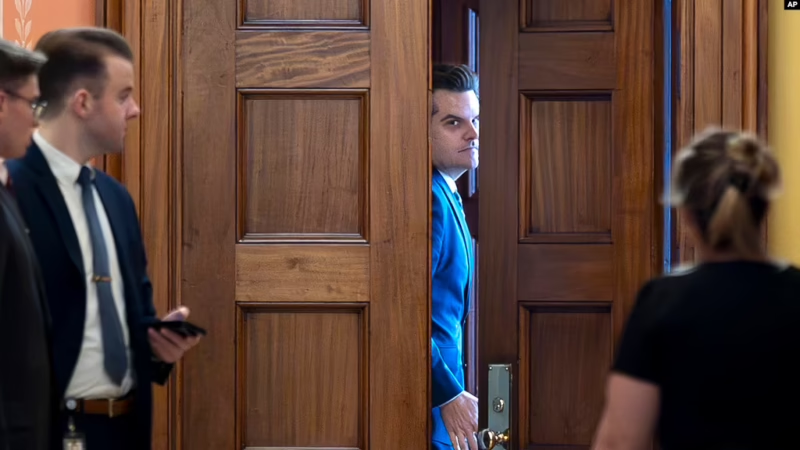
Former Republican Representative Matt Gaetz announced Thursday that he is withdrawing from consideration to serve as Attorney General in President-elect Donald Trump’s second administration. The decision follows mounting criticism and ongoing scrutiny of Gaetz’s alleged misconduct, which risked complicating Trump’s transition efforts.
“I had excellent meetings with Senators yesterday,” Gaetz wrote on X, the social media platform formerly known as Twitter. “While the momentum was strong, it is clear that my confirmation was unfairly becoming a distraction to the critical work of the Trump/Vance Transition.”
Ethics Report and Controversy
Gaetz’s decision comes on the heels of a contentious meeting by the House Ethics Committee, which failed to agree on whether to release a report from its long-running investigation into Gaetz. The inquiry focused on allegations of sexual misconduct and payments to two women, reportedly totaling more than $10,000, some of which the women claimed were for sex.
Although the Justice Department previously investigated these allegations and declined to bring charges, the ethics probe remained a contentious issue. Gaetz’s resignation from Congress earlier this week, shortly after his nomination, effectively ended the committee’s jurisdiction over the matter.
The ethics investigation and Gaetz’s resignation have intensified bipartisan calls for greater transparency. Several senators demanded access to the ethics report, citing its relevance to their constitutional role in vetting Cabinet nominees.
Reactions to Gaetz’s Withdrawal
The Trump transition team defended Gaetz, accusing critics of attempting to undermine the administration’s mandate to reform the Justice Department.
“The Justice Department reviewed every financial transaction Matt Gaetz ever undertook and found no wrongdoing,” a Trump spokesperson said. “These leaks are a politically motivated effort to derail a necessary overhaul of our legal institutions.”
Despite Trump’s public support for Gaetz, the nomination faced significant opposition. Gaetz’s tumultuous tenure in Congress—marked by controversial actions, including his role in ousting then-House Speaker Kevin McCarthy in 2023—had alienated some Republican lawmakers.
Senate Pushback and Support
In meetings with senators on Wednesday, Gaetz encountered resistance from members of both parties. Republican Senator Lindsey Graham, who met with Gaetz and Vice President-elect JD Vance, emphasized a fair confirmation process but acknowledged the weight of the allegations.
“These allegations will be dealt with in committee,” Graham said. “But [Gaetz] deserves a chance to confront his accusers.”
The Senate has not formally rejected a Cabinet nominee since 1989, but Gaetz’s candidacy presented a significant test of that tradition.
What’s Next for Trump’s Attorney General Nomination?
Gaetz’s withdrawal leaves Trump without a nominee for one of the administration’s most critical roles just two months before inauguration. The position of Attorney General is particularly pivotal in light of Trump’s stated priorities to reform the Justice Department and address what he has described as political bias within the agency.
Trump’s next nominee will likely face similar scrutiny, given the heightened partisanship surrounding his return to the White House and the enduring controversies tied to his administration.
Gaetz’s withdrawal marks a rare setback in Trump’s efforts to solidify his Cabinet but underscores the complexities of navigating a politically divided and scrutinizing Senate.
-

 Top stories2 months ago
Top stories2 months agoBiden Calls Out China’s Power Play Amid Economic Turmoil – And What It Means for the World
-

 Top stories2 months ago
Top stories2 months agoChina Test-fires Missile Into High Seas of Pacific
-

 Middle East2 months ago
Middle East2 months agoBiden, Harris Call Israeli Killing of Hezbollah’s Nasrallah ‘Measure of Justice’
-

 EDITORIAL2 months ago
EDITORIAL2 months agoDr. Edna Adan Champions the Evolving Partnership Between Somaliland and Ethiopia
-

 Election 20242 months ago
Election 20242 months agoSomali Presidency Accused of Funding Propaganda Against Jubbaland Leader Madobe
-

 Editor's Pick1 month ago
Editor's Pick1 month agoNavy SEALs’ Fatal Drowning Revealed to Be Result of Gear Failures During Anti-Terror Raid
-

 Middle East1 month ago
Middle East1 month agoDeath of Hamas Leader Brings Hope, Peril
-

 Piracy1 month ago
Piracy1 month agoSomali Pirates Resurface After 5-Month Lull, Threatening Global Shipping











